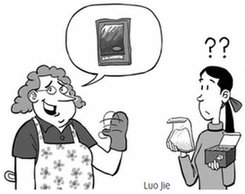The times they are a-changin'
By Lisa Carducci ( China Daily ) Updated: 2008-11-20 14:22:15

I was taking a bus in Beijing recently when a Chinese woman asked me: "Were you a teacher at Erwai before?" Actually, I was at the famous foreign languages institute between 1991-93, and I thought maybe she could have been one of my students. But she added: "Are you the person who wanted to buy brown sugar?" "Yes," I said hesitantly.
I thought back to when I was a newcomer and finally realized who she was. I asked the lady whether she was still working for the State-owned food store where I tried to find brown sugar. "Oh no!" she exclaimed. "That was so long ago. My husband and I opened a small private store in 1996, and four years later, a larger supermarket. We have more than 40 employees."
"And brown sugar?" "All kinds of products: light, medium, or dark brown sugar, even from foreign brands. China has changed a lot, you know!"
I surely know. During my first year at Erwai, the teachers' building only had heating and hot water from 6 pm to 8 am, and two hours in the evening in winter. The rest of the day you were supposed to be in class or in bed. One day per week, power was cut off in each area in turn. A year later, there was heating in the classrooms; and two years later, I could not even recognize the place when I went there again.
The day I first met the lady, I was planning to make some cookies, as I used to do every Sunday morning. Then I would bring them, still warm from the oven, to my students' dormitory. They were always expecting me.
At that time, a cookie, especially one made by the foreign teacher with a foreign recipe was something precious! The boys would not miss their chance, and they would also invite their best friends who were not my students to come to their rooms. Could I refuse to serve them too?
Well, I was preparing for baking when I realized I had run out of brown sugar. So I went to the food store. But I forgot to ask someone how to say "brown sugar" in Chinese before I left the campus.
Once at the store counter, I asked for kafei se tang (coffee-colored sugar). The shopkeeper offered me white sugar. "No, not white, but this color," I said, pointing to something brown in the store. The girls from the other counters came to my rescue. Fortunately, in those days there were more staff than customers, so they had time to lose with me and we had fun together.
One assistant showed me sugar cubes for coffee. It was not exactly what I was looking for. Another gave me coffee-flavored candy. Hopeless, I shook my head, and we all laughed. I thought I would return to the university and come back with the correct name.
After saying zaijian (see you later) to them, I walked out. Just before I got to the door, I saw something on a shelf, in a plastic bag, something that could have been brown sugar. "What is this?" "Zhe shi hong tang!" (That is red sugar!), replied the woman, smiling widely. Ah! This is what the Chinese call brown sugar!
After all, don't we Italians call an egg yolk "egg red", while French call it "egg yellow"? Don't we Westerners say "black tea", while Chinese call it "red tea"?
No matter how dark the Chinese brown sugar, I made very good cookies that day and brought some back to the ladies in the store.
"By the way," concluded the lady who had recognized me almost 20 years later, "your cookies were so tasty!"
(China Daily 11/20/2008 page20)
|
|
|
|
|
|
|
|


























 Raymond Zhou:
Raymond Zhou: Pauline D Loh:
Pauline D Loh: Hot Pot
Hot Pot Eco China
Eco China China Dream
China Dream China Face
China Face






